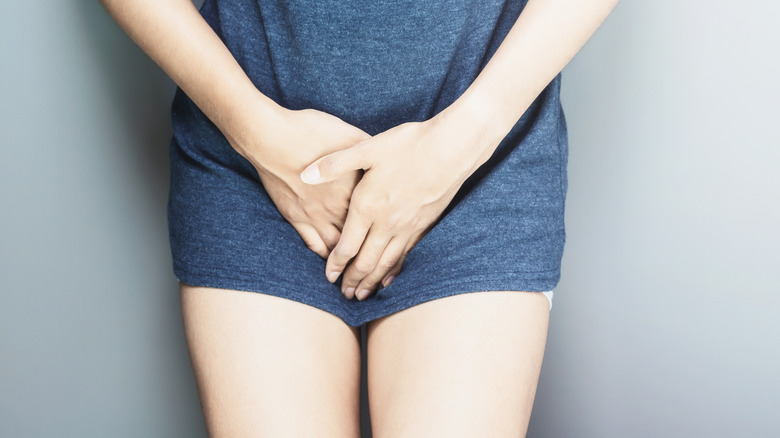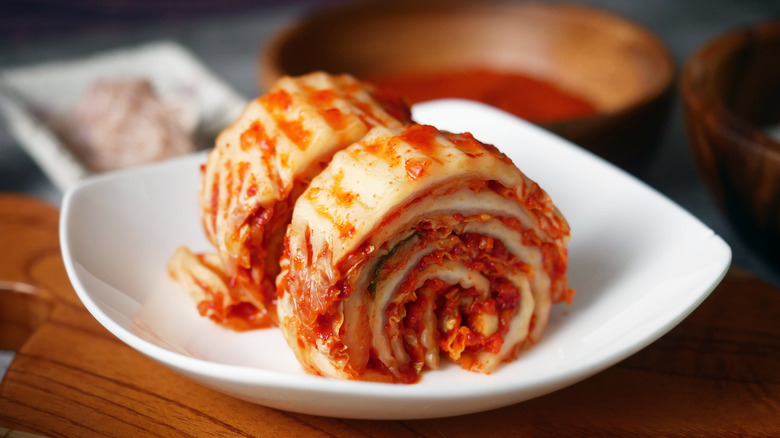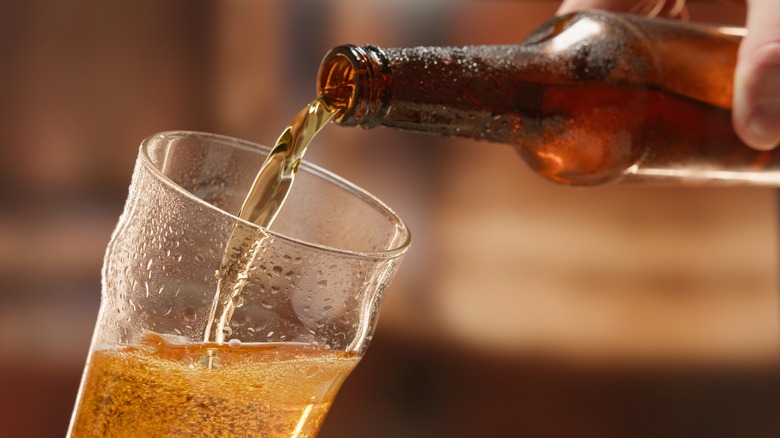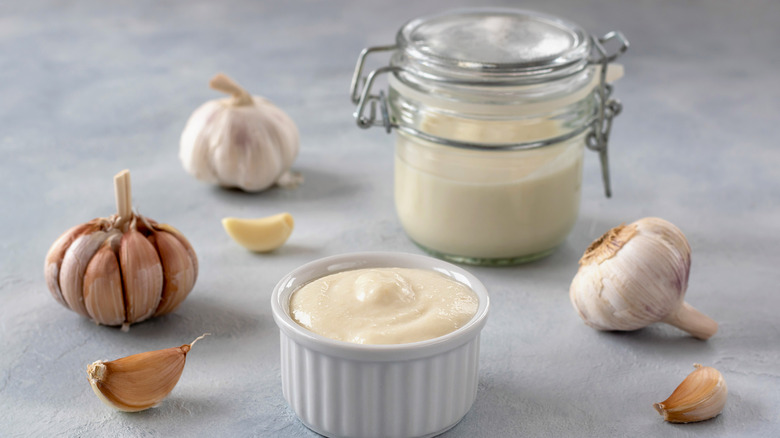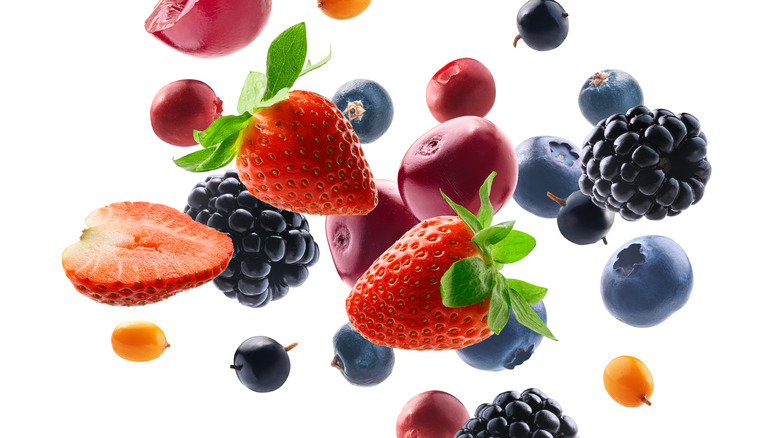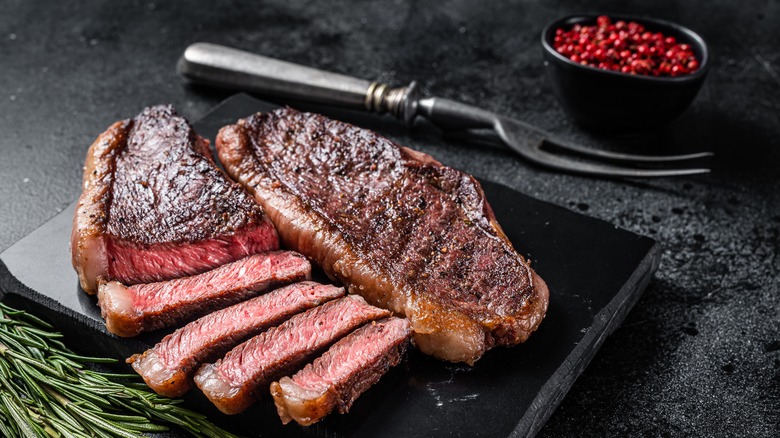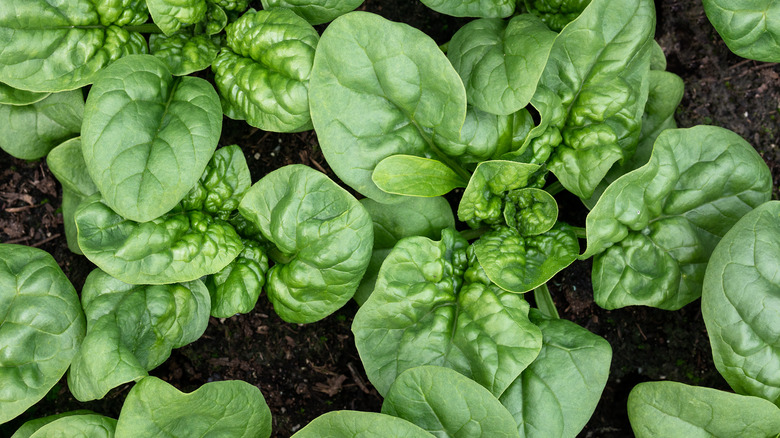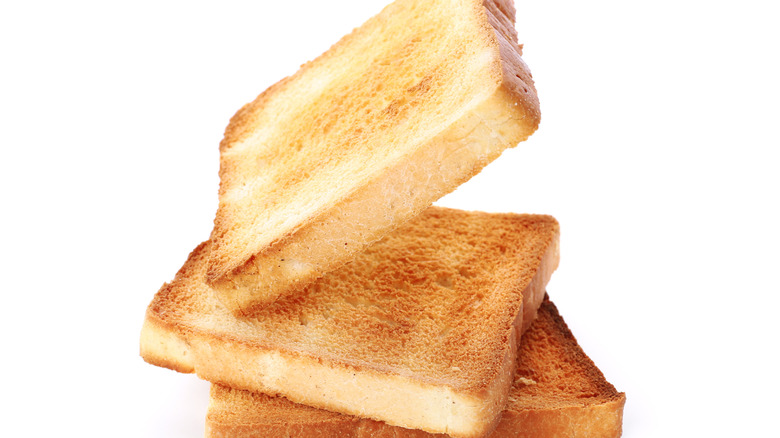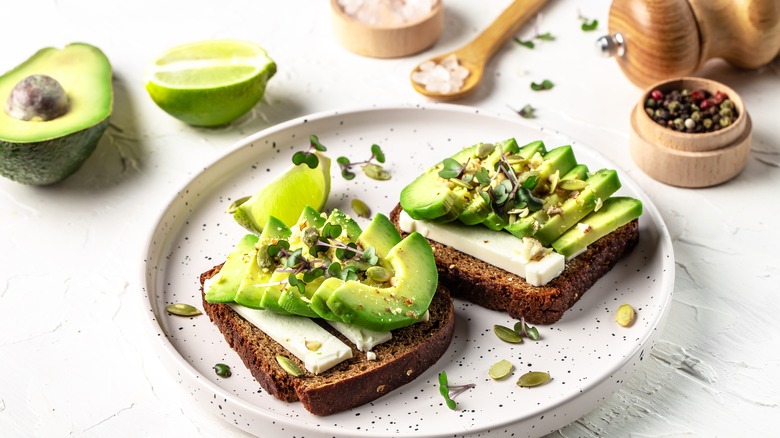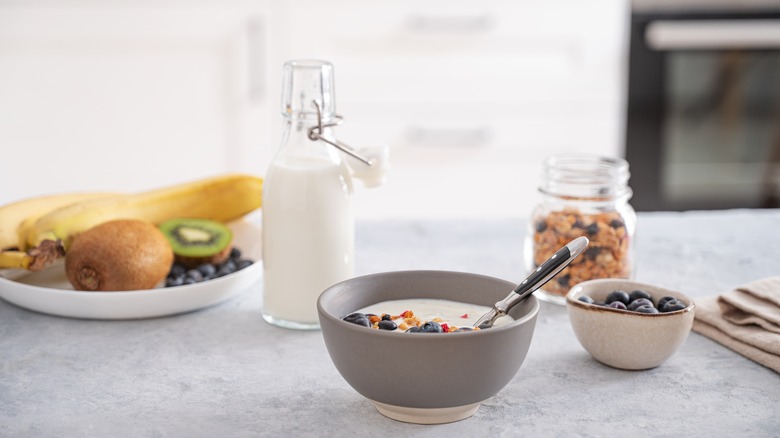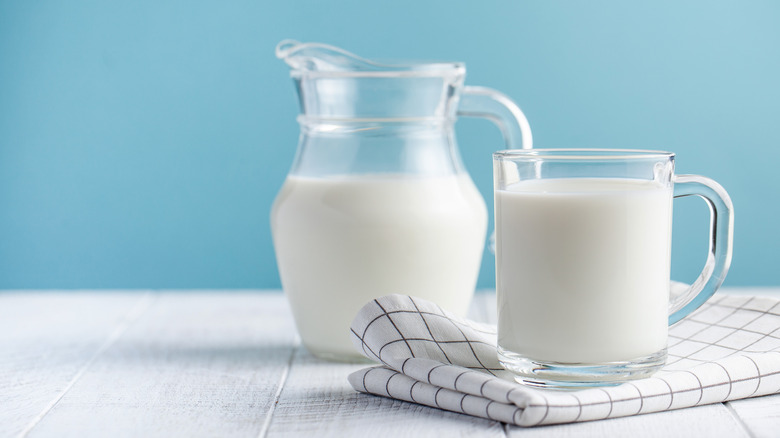6 Foods To Eat And 6 To Avoid For Vaginal Health
Just about every woman can sympathize with the ups and downs of vaginal health. When it comes to care of the vagina and reproductive organs as a whole, there seems to be a lot to keep track of: Is my period normal? How do I know when I'm ovulating? How does my diet impact vaginal health? If you've ever been concerned about a pain, discharge, smell, lump, or bump, don't worry — you're not alone. Women have been seeking guidance on their pelvic organs since ancient Greco-Roman times (via Britannica), so you can rest assured that anything you're experiencing has almost certainly been experienced before, and seen by a physician before.
But what if you want to take preemptive steps to prevent your vaginal health from being disrupted? From safe sex to good hygiene practices (no vaginal douching, says the Centers for Disease Control and Prevention) to diet, there are many good habits to adopt that battle against infections, inflammations, and other vaginal conditions. Here, we're going to cover the foods you should eat and the foods you should avoid for a happy, healthy vagina.
Eat: Kimchi
The pH level in a healthy vaginal microbiome ranges from 3.8 to 5.0, according to an article published in Diagnostics. This means that the vagina, by nature, is moderately acidic, and this acidity — which protects the vagina from bad bacteria and other pathogens — is prone to fluctuations due to sex, douching, infections, or aging. An off-balance pH level leaves the vagina vulnerable. However, a great way to reinforce a balanced pH is by focusing on probiotic-rich foods, like kimchi.
Kimchi is a traditional Korean sauerkraut made from fermented vegetables, most commonly with cabbage, according to Revolution Fermentation. Radish, garlic, ginger, and chili might be added for flavor. A review in the Journal of Medical Food suggests that kimchi is so probiotic-rich that its health benefits are similar to the widely known probiotic supplier, yogurt. We recommend eating kimchi in rice bowls, over eggs, or in stews (via Epicurious). You can even make kimchi at home to always have on hand.
Avoid: Alcohol
There's not really much to argue in the case for alcohol at all, is there? According to the Cancer Council of Victoria, alcohol is a known carcinogen — meaning it has definitely been proven to cause cancer. The liver, mouth, throat, esophagus, bowel, stomach, and breast are all at higher risk of developing cancer after prolonged alcohol consumption. The Cancer Council explains that this is because alcohol damages DNA and causes abnormal replication of cells, and also allows increased absorption of other carcinogens by damaging the tissues in your body.
While this is all more long-term damage, even one drink can impact vaginal health by severely dehydrating the body — one alcoholic drink can cost you four times its volume in water, WebMD says. In turn, this leads to diminished natural lubrication (via Hello Flo). Water's important role in vaginal health doesn't stop at lubrication; according to Hello Flo, dehydration can also decrease the amount of good bacteria and yeast in the vagina, potentially leading to infections.
Finally, alcohol might disrupt your sex life: According to a study published in Archives of Sexual Behavior, drinking alcohol before sex may also cause you to feel less vaginal sensation overall and have a more difficult time reaching orgasm (via Medical News Today).
Eat: Garlic
There are bacteria in the vagina — which may sound alarming, but in fact, they are meant to be there. These are the good bacteria living in the vagina — called vaginal flora — and they produce substances like hydrogen peroxide and lactic acid to ward off yeast overgrowth and pathogens (via Probiotics Learning Lab). These bacteria belong to the lactobacillus family and could do with a little support from one of the best spices for your health: garlic.
While ancient uses of garlic that involve topical and internal vaginal application to battle yeast infections are not proven to be effective (GoodRx Health), incorporating more of this aromatic into a daily diet may benefit vaginal health, per Healthline. Garlic contains many antibacterial and antifungal properties due to its main active compound, allicin. If the utmost amount of support is needed, look into oral garlic tablets or garlic extract to help with chronic yeast infections. Topical garlic extract creams are available, but be sure to follow directions closely, and always consult your gynecologist before administering a cream to the vaginal area or taking a supplement for vaginal health.
Avoid: Artificial and refined sugars
Some vaginal yeast is okay and actually beneficial, but this yeast feasts on sugar and can overproduce if there are too many refined or artificial sugars in your diet. According to Happy V, foods that are abundant sources of these sugars include sugary beverages like soda, many cold cereals, and sweets like cakes and donuts. When there's an overload of this sugar, yeast production takes off, making the vagina vulnerable to bacterial vaginosis and yeast infections.
Happy V adds that sugary, processed foods will spike blood sugar levels, which can suppress the immune system. And when the immune system is compromised, the chance of infections, vaginosis, and even contraction of sexually transmitted diseases increases. As much as possible, make sure the sugars in your diet are natural and come from sources like fruits and vegetables. These sugars — called fructose, via Healthline — are packed with beneficial fibers that will support your overall health, and they won't affect your blood sugar as severely.
Eat: Berries
You've probably heard of the magical substance called antioxidants, but do you know how they benefit vaginal health? As the Mayo Clinic explains, antioxidants prevent free radicals — unstable atoms that lead to illness, cell damage, and aging, via Medical News Today – from attacking the cells in your organs, including the vagina. The best food sources of these antioxidants are fruits and vegetables, nuts and seeds, and whole grains.
A review published in Reproductive Medicine International found that oxidative stress — which occurs when free radicals attack your cells — is a main cause of vaginitis, and that boosting antioxidant intake "significantly improved" symptoms through three mechanisms: reduction of bad bacteria, development of good bacteria, and balancing of vaginal pH.
Berries are packed with these precious infection-fighting antioxidants, according to Healthline, with raspberries, blackberries, and blueberries having the highest levels of antioxidants. Additionally, berries have great anti-inflammatory properties and might help regulate your blood sugar levels (which prevents immune system compromise, Happy V says).
Avoid: Red meat
As tempting as the filet mignon on the steakhouse menu might be, you might want to opt for ordering the salmon instead if you've got vaginal health in mind. According to a review in the Public Health Nutrition Journal, the high levels of saturated fats in red meat have a strong correlation with harmful inflammation and cancer mortality. Another report in the American Journal of Obstetrics and Gynecology states that women who consumed high amounts of red meat had a 56% higher chance of developing endometriosis than those who consumed no more than one serving per week. The study also observed people with diets that were heavy in poultry and seafood and found no correlation to endometriosis.
To prevent inflammation, the Cleveland Clinic recommends steering clear of any beef or pork products, including bacon, hot dogs, jerky, and cured meats like pepperoni and salami, or limiting consumption to no more than two 6-ounce servings per week.
Eat: Leafy greens
If you're looking for foods that serve as natural lubricant boosters, look no further than dark leafy greens. Foods like kale, spinach, and bok choy are rich in vitamins and antioxidants, as well as fiber, magnesium, and iron, according to the U.S. Department of Agriculture (USDA). All of this is great news for your overall health, but what about the vagina specifically? According to Insider, dark leafy greens also contain high amounts of beta carotene, a natural plant pigment known to help the body produce vitamin A (via WebMD).
Vitamin A — and vitamins B and E — can help stimulate natural lubrication. Women struggling to combat vaginal dryness should stock up on their favorite dark leafy greens, and be sure to store the vegetables properly so you can waste as little as possible (via Wirecutter). If you don't like the taste of dark leafy greens, you can incorporate them into smoothies, burgers, and even baked goods to disguise the flavor (via The Guardian).
Avoid: Grains with gluten and sugar
Hormones — more specifically, estrogen and progesterone — play an important role in your vaginal health. Healthy levels of estrogen mean a well-lubricated and elastic vagina, while depleted estrogen levels cause thinness of vaginal tissue, dryness, and inflammation (via Apple Hill Gynecology). Hormonal changes can wreak havoc on the delicate balance in the vagina's microbiome, leading to burning, redness, discharge, itching, or pain during intercourse. Some foods contain chemicals known to mess with your hormones. These chemicals are known as endocrine disruptors, and they can impact not only the reproductive system but also the brain, immune system, and developmental progress in children, according to the National Institute of Environmental Health Sciences.
As Mind Body Green explains, the gluten and sugar in white bread can lead to deregulation of hormones in the ovaries, adrenal gland, and thyroid. Gluten can act as an endocrine disrupter for some people, the Deccan Herald explains, which "can lead to dysfunction in hormonal harmony." USDA data does state that whole grain bread has less sugar than white but, as WebMD explains, all types of bread and grains are likely to contain gluten unless specified otherwise. The ovaries are the organs responsible for those hormones that keep the vagina happy and healthy, so if you suspect hormonal imbalances to be the culprit behind any vaginal issues, try reducing the grains in your diet.
Eat: Avocado
Despite some people not enjoying the taste and health benefits of avocado, this fruit is packed with vagina-supporting properties. Avocados have natural inflammation-fighting powers that may help soothe the vaginal inflammation that occurs in response to irritation or off-balance pH, explains Uqora. The healthy fats in avocados are also known to regulate cholesterol and estrogen levels. According to Stix, good cholesterols also help the body produce estrogen, progesterone, and vitamin D.
As covered by Apple Hill Gynecology, healthy levels of estrogen will keep natural lubrication levels up and encourage thick tissue in the vaginal walls. Estrogen and progesterone are also responsible for libido, so keeping avocado in your diet may help with sex drive and function. Avocados may be frustrating or intimidating because of how difficult it is to keep them from over-ripening (via Healthline), but there are tons of avocado recipes out there to ensure you can use up all your avocados before they turn.
Avoid: Coffee
Look, we get it. We didn't want to be told that a morning cup of java does anything other than brighten our eyes and bushy our tails. But the truth is in the numbers: Vaginal pH should be kept mildly acidic (via Healthline). And, according to Scientific Reports, "Cold brew coffee chemistry was compared to that of hot brew coffee prepared with the same grind-to-coffee ratio. The pH values of the cold and hot brew samples were found to be comparable, ranging from 4.85 to 5.13." When the vaginal pH climbs over 4.5 — which is moving closer to neutral and alkaline or basic — the environment becomes perfect for bad bacteria and other pathogens to compound, Healthline explains.
Flo Health adds that coffee might sway a vagina's natural musk. Coffee is one of a few foods that may be responsible for changing the natural vaginal smell by changing the microflora's acidity. Odors can range from foul and fishy to sour or stale. If it's suspected that overconsumption of coffee has disrupted the natural vaginal pH, cut back on the brew for a few days and focus on the vagina-supporting foods discussed here.
Eat: Greek yogurt
Greek yogurt has long been appreciated for its probiotic content known to support a healthy gut biome, according to a BMJ Journals report. More research needs to be done into the potential ways that Greek yogurt probiotics support vaginal health, but some has concluded that at least one probiotic strain can help prevent problems like yeast infections and bacterial vaginosis that result from imbalance of the vaginal pH, according to Healthline. A vagina with healthy levels of lactobacilli bacteria will be less susceptible to inflammation and infections, Healthline says, and may also have fewer issues with abnormal odors.
Probiotics can also be obtained in oral capsule supplement form, and the Cleveland Clinic says that taking a supplement with the strain Lactobacillus crispatus specifically has a good chance of warding off bacterial vaginosis, while Lactobacillus rhamnosus may help with yeast infections. Recurrent infections or vaginosis, however, should always be brought to the attention of a gynecologist.
Avoid: Dairy products
With the exception of Greek yogurt, dairy products generally don't bode well for vaginal health. As Nebraska Medicine explains, this is thanks to the artificial hormones pumped into certain dairy products. These hormones, called xenoestrogens, are meant to imitate estrogen (via Scientific American). They're injected into foods for a variety of purposes from preventing discoloration to acting as preservatives, according to Scientific American. There are consequences of ingesting xenoestrogens when it comes to the vagina: These artificial hormones can prevent estrogen from reaching the vagina, possibly leading the mucosal lining to deteriorate and leaving the organ vulnerable to infection.
Further, cheese and other dairy products can disrupt naturally occurring bacteria (per Women's Health). While you don't have to cut dairy products out entirely, if you'd like to lighten up the dairy consumption in your diet, consider rotating in Greek yogurt, choosing plant-based milks, or trying out vegan cheeses.

